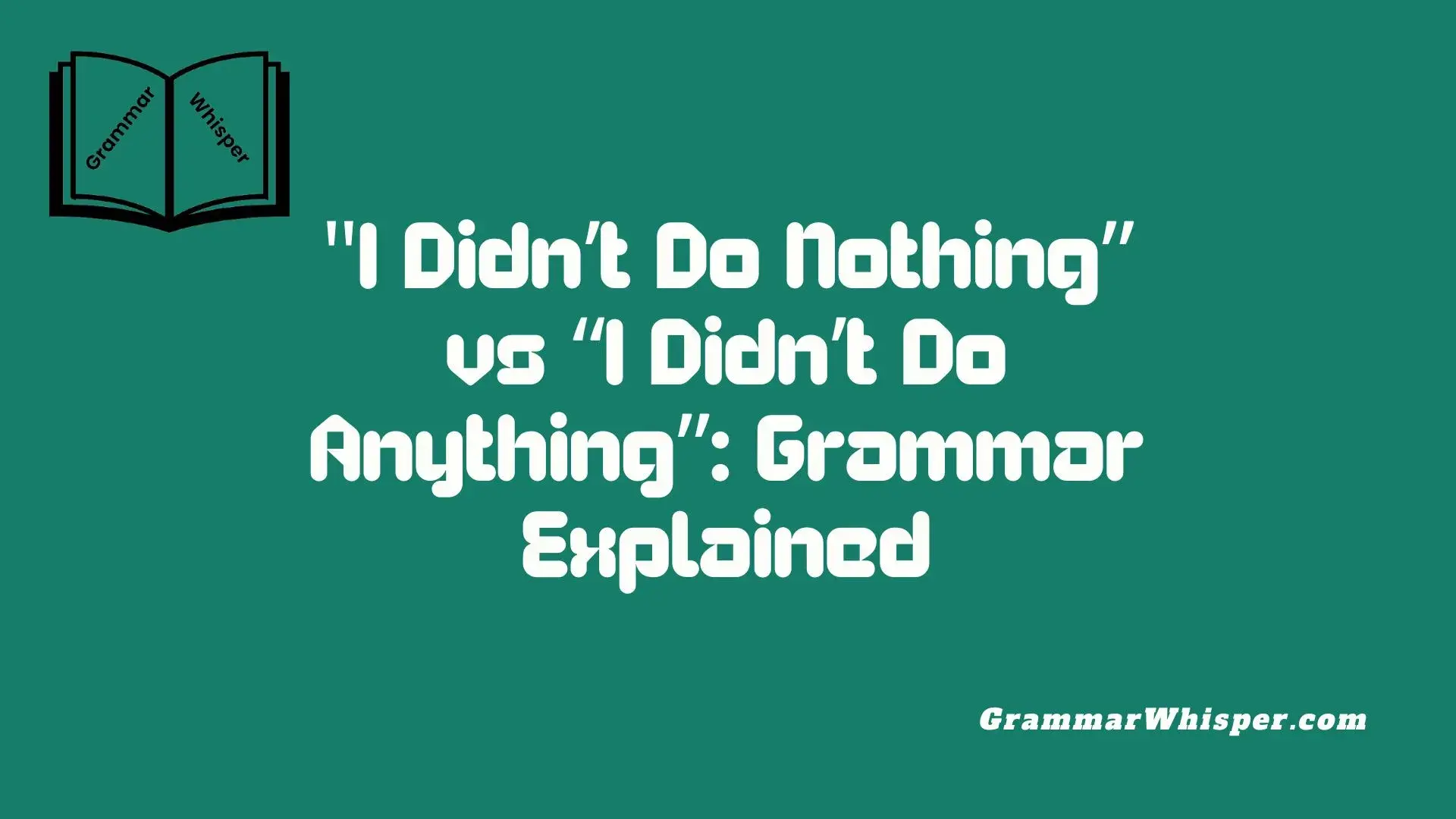In everyday conversations, you might hear people saying “I didn’t do nothing” as casually as “I didn’t do anything.” But is it grammatically correct? The use of double negatives in English has long been a topic of debate. While some see it as an acceptable part of informal speech, others argue that it’s a grammatical error that can lead to confusion.
Double negatives, or the combination of two negative words, can result in an unintended or overly complicated meaning. To clarify, double negatives can either strengthen the negation or cancel it out altogether, depending on the language and context. English, however, follows the principle of using a single negation to express negative meaning clearly and concisely.
In this post, we will delve deep into the difference between “I didn’t do nothing” and “I didn’t do anything,” helping you understand why the latter is grammatically correct and the former is not. We will also explore when it is appropriate to use double negatives in informal speech and why you should avoid them in formal communication.
Exploring the Grammatical Structure of Negation
Before we dive into the specifics of “I didn’t do nothing” and “I didn’t do anything,” let’s first understand how negation works in English.
How Negative Sentences Are Formed
In English, negation typically involves the use of “not” to negate a verb. For example:
- “I do not like chocolate.”
- “She is not coming to the party.”
Here, “not” negates the verb, turning the sentence into a negative one. In some cases, negation can also be reinforced using negative words like “never” and “no one.”
However, when multiple negative words appear in a sentence, things get a little tricky. The problem arises when two negations are used together, which results in a double negative.
The Role of ‘Not’ in Negative Sentences
In English, “not” is the primary negation word used to convert positive sentences into negative ones. For example:
- Affirmative: “I am happy.”
- Negative: “I am not happy.”
Here, the negation “not” is added to the verb “am” to negate the statement. English speakers rely on this pattern to express negation clearly.
Why Double Negatives Are Problematic
When double negatives are used, they often create confusion. While languages like Spanish and French may accept double negatives to intensify the negation, English follows a different rule. In English, double negatives are often considered incorrect in standard grammar, unless they are used in a specific context or in certain dialects.
The Meaning and Usage of ‘Anything’ in Negatives
Now that we understand how negative sentences work, let’s look at the word “anything.” In the phrase “I didn’t do anything,” “anything” acts as an indefinite pronoun that reinforces the negative meaning of the sentence. It’s used in negative statements to refer to an unspecified object, action, or event.
Why “Anything” Works in Negation In a negative sentence, “anything” refers to the absence of an action or object. This is the correct form of negation in English, and it preserves clarity. For example:
- “I didn’t do anything all day.”
Here, the speaker is expressing that no action was performed at all. It’s straightforward and unambiguous.
Comparison with “Nothing” If you were to say “I didn’t do nothing,” the use of “nothing” creates a double negative. This phrase would generally be understood as an intensified negation, meaning the speaker didn’t do anything at all. However, this structure is nonstandard and should be avoided in formal contexts.
When Slang Meets Standard English: Analyzing “I Didn’t Do Nothing”
“I didn’t do nothing” is often used in casual speech, particularly in certain dialects or colloquial speech patterns. It’s considered a double negative, but in informal speech, it’s sometimes used for emphasis.
Why Some People Use Double Negatives The use of double negatives in informal speech is common in certain regional dialects or slang. For instance, people from various parts of the Southern United States or African American Vernacular English (AAVE) may use double negatives as part of their everyday vocabulary. This usage is understood within those communities and doesn’t necessarily create confusion.
However, in Standard English, double negatives are typically frowned upon, and it’s recommended to avoid them to maintain clarity in professional and formal writing.
The Right Way to Deny Actions: Using “I Didn’t Do Anything”
The grammatically correct way to express the absence of an action is “I didn’t do anything.” This sentence maintains the integrity of English negation and is clear and unambiguous.
Why “I Didn’t Do Anything” Is Correct The structure follows standard grammar rules:
- Subject: I
- Auxiliary verb: didn’t (short for “did not”)
- Verb: do
- Object: anything (negative indefinite pronoun)
By using “anything,” the speaker correctly negates the action. It doesn’t lead to confusion and is widely accepted in both spoken and written communication.
When to Use “Anything” in Negation Use “anything” in negative sentences or questions to indicate the absence of an object, event, or action. Here are a few examples:
- “I didn’t do anything wrong.”
- “She didn’t say anything about the problem.”
- “Is there anything I can do to help?”
Why “I Didn’t Do Anything” Is Preferred in Formal Contexts
In formal communication, clarity is essential. Whether you’re writing an email, a report, or delivering a presentation, using proper grammar is key to conveying your message effectively.
The Importance of Correct Grammar in Professional Communication In a professional or academic context, using double negatives like “I didn’t do nothing” can make you sound less credible or polished. Instead, “I didn’t do anything” should be used to convey your message without introducing unnecessary confusion.
Common Misconceptions and Clarifications About Negatives
There are many misconceptions surrounding double negatives, particularly when it comes to their impact on meaning. Some believe that using two negatives automatically results in a positive, but that’s not the case in standard English. Let’s break down some common myths.
Myth 1: Two Negatives Make a Positive In some languages, two negatives can cancel each other out, resulting in a positive statement. However, in English, double negatives intensify the negation rather than canceling it out. For example:
- “I didn’t do nothing” = I did absolutely nothing. (A stronger negation, but incorrect in formal English.)
Myth 2: Double Negatives Are Always Acceptable in Informal Speech While double negatives are common in certain informal dialects, they are still considered incorrect in standard grammar. It’s important to use “anything” instead of “nothing” in most contexts.
How Misusing Double Negatives Can Alter Your Message
Double negatives can create unnecessary ambiguity and confusion in your message. In professional settings, it’s especially important to avoid them. Here are a few examples:
- Example 1: Incorrect: “I didn’t do nothing wrong.” Correct: “I didn’t do anything wrong.” In this case, the use of “nothing” could be misinterpreted or sound unprofessional.
- Example 2: Incorrect: “He didn’t do no work today.” Correct: “He didn’t do any work today.” Using “no” in this instance is grammatically incorrect and should be avoided.
The Impact of Regional Dialects on the Use of Double Negatives
Double negatives are not universally incorrect. In fact, some dialects and languages embrace them more comfortably. Let’s explore how regional dialects affect their use.
Regional Variations
- African American Vernacular English (AAVE): In AAVE, double negatives are often used for emphasis, and they don’t cancel out the negation. For example, “I didn’t do nothing” in AAVE means “I didn’t do anything at all.”
- Southern English: Similarly, speakers of Southern English often use double negatives like “I ain’t done nothing” as a part of everyday speech.
However, Standard English calls for the use of “anything” in negations to ensure clarity.
Best Practices for Clear Communication in Professional Settings
Grammar is crucial in professional settings, especially when communicating with colleagues, clients, or customers. Here’s how to ensure your grammar is clear and effective:
- Use Correct Negation: Always use “anything” instead of “nothing” to ensure clarity.
- Proofread Your Work: Check for double negatives before submitting any formal documents.
- Stay Consistent: Stick to clear, standard grammar rules to maintain professionalism.
Conclusion
In conclusion, while double negatives like “I didn’t do nothing” are often used in informal speech, they are not grammatically correct in Standard English. The correct phrasing is “I didn’t do anything,” which maintains clarity and follows English grammar rules.
In professional and formal communication, using correct grammar is essential for effective communication. Avoiding double negatives and ensuring your message is clear will help you maintain credibility and professionalism.
FAQs
What is a double negative?
A double negative occurs when two negative words are used in the same sentence. In English, this can lead to confusion and should generally be avoided.
Is it grammatically incorrect to say “I didn’t do nothing”?
Yes, “I didn’t do nothing” is considered grammatically incorrect in standard English. The correct phrase is “I didn’t do
Why do some people use double negatives in casual speech?
Double negatives are often used in certain regional dialects and informal speech for emphasis, but they are not considered standard in English grammar.
When should I use “I didn’t do anything” instead of “I didn’t do nothing”?
Use “I didn’t do anything” in both formal and informal contexts to avoid confusion and follow correct grammar rules.
Can double negatives be used for emphasis in any context?
In certain dialects, double negatives can emphasize negation, but in formal writing, it’s best to avoid them for clarity.











